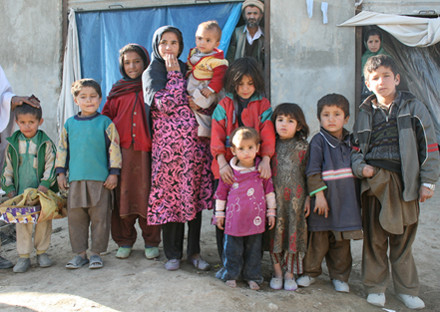It is well known that the Taliban, local criminals and international drug cartels profit enormously from the drug trade; that corruption is rife; and that huge amounts of aid money are pouring into Afghanistan. Less clear is the effect of all this on government power and the rule of law on which humanitarian aid organizations depend to carry out their mandate.

The overwhelming victims of corruption and drug-induced insecurity are ordinary Afghans. (Photo: Akmal Dawi/IRIN)
The drugs trade and corruption generate more money than lawful economic activities in Afghanistan. Opium sales generated an estimated US$2.8 billion in 2009, while in the same year Afghans paid $2.5 billion in bribes to government officials, according to the UN Office on Drugs and Crime (UNODC).
The drug-cum-corruption economy of $5.3 billion in 2009 is more than the $4.4 billion earmarked in 2010 for running the government and financing the development budget.
The overwhelming victims of corruption and drug-induced insecurity are ordinary Afghans, according to the Ministry of Counter-Narcotics (MCN).
“It is almost impossible to obtain a public service in Afghanistan without greasing a palm: bribing the authorities is part of everyday life,” said a UNODC survey, which described corruption as “the biggest problem” in the eyes of Afghans. “Bribery not only robs the poor and causes misallocation of resources, it destroys trust in government.”
Jean-Luc Lemahieu, UNODC’s country representative, was skeptical of the notion of linking drug money with corruption “yet nobody can argue that drug money and corruption are one unholy alliance sharing the same sick bed,” he told IRIN.
International mafia to blame?
MCN officials blame a powerful international mafia for the drugs trade.
“The mafia kills our counter-narcotics forces, abuses our institutions and even threatens the minister of counter-narcotics,” said Zalmai Afzali, MCN’s spokesman.
Hamidullah Farooqi, a former minister and economist, said drug money had deep roots and involved powerful circles both within and outside government.
“Whether Afghans or foreign mafia are nurturing the drug trade is less important than why the problem is not being effectively addressed,” Farooqi told IRIN, adding that there was a lack of commitment in government to tackle the booming illegal economy.
Afghanistan is the world’s top opium producer, according to UNODC, and its government is the most corrupt in the world after Somalia, according to Transparency International. The opium trade employs about 1.6 million people (6.4 percent of the population), according to the World Bank.
Backed by donors, the government has tried several counter-narcotics and anti-corruption strategies and approaches over the past eight years.
Too powerful
Tackling drugs and corruption, however, is risky as law enforcement institutions are weak and those with vested interests in the illicit economy powerful.
“The so-called elite that thrives on the illegal economy is so powerful that it can destabilize the country if revolutionary steps are taken to change the status quo,” said Saifuddin Saihoon, a professor of political economy at Kabul University.
“Corruption and drugs undermine the rule of law, erode peoples’ confidence in the government, fuel insecurity, contribute to poverty and derail development efforts,” said former minister Farooqi.
“We all eat corruption and drug money, albeit in different quantities,” said an official in the Finance Ministry who preferred anonymity.
Aid-dependent
At the same time, Afghanistan’s high level of foreign aid dependency could also be undermining government power: A $2 billion development budget is largely funded by donors, officials at the Finance Ministry said.
Several years ago both the development and the “ordinary” budget were mainly donor-funded. Over the past four years the government has increasingly contributed (via domestic revenue) to its “ordinary” budget, but its contribution was still only 60 percent of the $2.4 billion total in 2010.
Many Afghans say foreign assistance is not indefinite and the post-Taliban donor-driven development process will fall away soon after NATO withdraws its troops.
“A sudden discontinuation of foreign assistance will have grave consequences for Afghanistan,” said Naveed Bakhshi, a Finance Ministry official.
A huge illicit economy and unending dependence on foreign generosity is unsustainable, experts say.
“Our achievements in health, education and other sectors are so fragile that without donors’ constant financing everything will fall like dominos,” said Shukria Barakzai, a member of parliament.
“Take drug money and foreign aid away and you would find Afghanistan collapsing in extreme destitution,” said Saihoon of Kabul University.
Meanwhile, UNODC’s Lemahieu says corruption and drugs will be a tough nut to crack: The illicit economy trusts “that lawlessness and crime are its best partners, not transparency and accountability", he said, adding that these problems would fade away with state growth.
However, building a viable state and implementing the rule of law cannot be achieved without bringing the informal economy to heel and ending criminal activities - an impossible Catch-22 situation, experts say.



